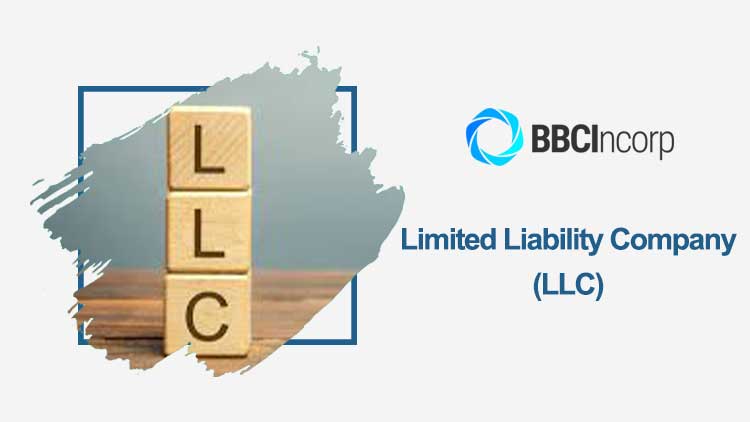
Let’s say you have decided to structure your company with a Limited Liability Company (LLC). However, for certain reasons, you want to incorporate the company remotely.
Many entrepreneurs are living as digital nomads with no fixed location and work remotely with digital platforms. It is obvious that they prefer the online process to get their businesses started for convenience. In addition, the Covid19 pandemic that has been spreading all over the world has raised the demand for online business registration.
Then you must be wondering “How to start an LLC online?”
A long time ago, registering a company was a big issue with a huge amount of paperwork and physical presence. But thanks to digitalization as a global trend, you can now own an LLC in just a few clicks.
Let’s dig into the detailed instructions on how to start your LLC from your home.
1. Key features of an LLC

LLC places among the most common business entities in the US thanks to the straightforward formation and distinct features. The regulations will vary by states.
LLC is a legal business entity that has the combined characteristics of a partnership and a corporation:
- Members of an LLC that will be responsible for the company management have limited liabilities;
- An LLC has a separate legal personality from the members, or owners;
- With pass-through taxation, an LLC’s profits and losses will be taxable as personal income of the members.
Furthermore, you can count the amount of salaries paid to members as the operating expenses. Thus, it can be directly deducted from the company profits.
Let’s see how to differentiate LLC with other business entities, or if you are considering other structures for your business in this article: How To Choose A Legal Structure For Your Business.
2. How to start an LLC online

Smoothen the registration process by taking these instructions. Below are 5 main steps to register an LLC remotely.
Step 1: Choose where to start the LLC
Among fifty states, how could you choose the right one to set up your LLC?
First, you must determine the business model of your company: online, brick-and-mortar or hybrid. It will affect the tax amount you will pay for the company.
The sales tax and asset protection are the most-concerning issues when it comes to operating an eCommerce business.
After deciding the best marketplaces for your online business, you should choose a jurisdiction where you can minimize sales tax.
Moreover, there is a high possibility that your online business will get sued due to the fault delivery or product damages. Thus, choose a state where the asset protection laws are strong.
For the related purposes, Delaware LLC is worth considering thanks to its high level of personal asset protection. You also don’t have to submit sales tax to the state for any purchases of your customers within the state. Another plus point is that the state doesn’t collect state income tax for income sourced out of the state border.
With brick-and-mortar business, the property tax is probably one of the top considerations. Then, a state that has a minimal tax rate for real estate is a good choice. Hawaii is the state with the lowest property tax rate in the US, which is 0.30%. Moreover, Wyoming, Alabama and Delaware also have the best tax rate for property.
Determining where you are going to transact the business is another important thing to consider. If you aren’t going to do business in the state of the LLC registration, pick a state that has the minimal tax regime such as no state income tax, no personal income tax.
Step 2: Name your company
Usually, from the perspective of a business owner, a company name is to reflect brand identity. Particularly, it is not only about the brand-related matters but also the legal issues.
Two common terms regarding business names that you should be clear are entity name and Doing Business As (DBA) name.
A legal entity name is the name that you’ll register with the state for company registration. The name must comply with the state’s rules and regulations. A business name that fails to comply with the related requirements will lead to the failure of the company registration.
Most states will require the company name to:
- Be the unique name in the company register
- Follow the company act of the state of company registration
Besides, you can reserve your desired company name in most states to avoid being taken by other companies.
Wonder if your desired business name is available? Check out the Entity Name Check Tool!
Being distinctly different from an entity name, a DBA name is a fictitious name that you want your customer to identify your brand as.
An LLC will be in need of a DBA name when you want to name a specific business branch. In this way, you don’t need to waste your time and resources to start a new business registration under another legal entity.
Typically, you must register the DBA name with the state of company formation following the related rules.
Step 3: Appoint a registered agent
Most US states will require you to have a registered agent to work on behalf of your company. The agent will act as the intermediary to receive legal documents and notices of your company from the state of registration.
Each state will have their requirements of the registered agent. Generally, a registered agent will be regulated as follows:
- Be an individual who is at least 18 years old, or a registered legal entity;
- Be resident in the state of company formation;
- Have a physical address or office within the state where your company is formed; and
- Be available during business hours.
Some states require the registered agent to meet the licensing requirements.
Note that you can be your own registered agent if you satisfy all aforementioned requirements.

Step 4: File Articles of Organization
Articles of Organization is a legal document used to establish an LLC in a state. Some states have different ways to name the document such as Certificate of Formation or Certificate of Organization. You must file the document to the official department that is authorized to handle the company registration.
Each state will have an official department to receive and process all company registration applications. The department will be considered as the Secretary of State.
The first thing you need to do is check all required documents and information for the filing. Below are the common requirements:
- Name and address of your company;
- Name and address of the registered agent;
- Names and addresses of the LLC members; and
- Your business purposes.
All states will have their own forms of Articles of Organization for the registration. You can download the form via the state website. Then fill in the form and submit it to the Secretary of State with the required fees.
The Secretary will review if your business is qualified for the authorized Articles of Organization. They will contact you via the registered agent regarding the extra required information and the final result.
Note: Each state will have their own legal requirements for company registration. Therefore, for detailed information, you must do a careful research on the company act of the state of business registration. This will help you increase your chances of getting an LLC.
Step 5: Proceed additional procedures after the registration filing
Create an operating agreement (optional). This is an agreement drafted by a professional or LLC member to manage all internal information and operations. It will regulate all business affairs of the LLC.
Apply for Employer Identification Number (EIN). The number will be mandatory for tax identification purposes and bank account opening. You can obtain the number by submitting the related application to the IRS.
Satisfy licensing requirements. Failure to comply with the licensing requirements will result in heavy penalties or being forced to close the business. It is crucial to know Types of Business Licenses & Permits that are subject to your business.
Open a bank account. You will need to manage payments and other business transactions of your LLC. In some cases, opening a local US bank account may be not eligible, especially for non-residents, then you can consider opening a business account with Electronic Money Institution (EMI).
An EMI account will act as the alternative to a bank account with the same basic functions. You can typically receive and perform all payments with the account. Common EMI accounts in the US are Wise account, Payoneer account and Mercury account.
Try our banking tool to see the recommended solutions to manage your company payments.
Comply with tax and other reporting requirements. This is a complicated issue for most entrepreneurs. The requirements are different in every state. Failing the compliances will cost you a fine.
For instance, Delaware LLC with a late due date for annual tax will be subject to a penalty of $200 plus 1.5% of interest each month on the penalty.
Besides, there is a possibility that your company will be forced to close the business.
The most common related requirements are annual tax and annual report. Others may be Foreign Bank And Financial Accounts Report (FBAR) or Foreign Account Tax Compliance Act (FATCA).
Note that some states don’t require LLC to file annual reports such as Arizona. Moreover, Pennsylvania only requires LLC to do the report every 10 years.
3. Costs for starting an LLC

Key costs that you must prepare for the online LLC registration are:
- LLC filing cost requires the the Secretary of State, which will be usually around $40 and $800;
- Maintenance fees such as annual fees, franchise taxes, registered agent;
- Additional costs such as operating agreement drafting (if any), publication*.
* Some states have requirements for publishing notices in specific newspapers at the state or county level.
4. Possible reasons why you may fail to register an LLC online
There are five main reasons of failure to obtain an LLC online:
- You don’t provide enough required information;
- You don’t submit required fees such as registration filing fee;
- Your company doesn’t meet licensing requirements;
- Your company doesn’t meet EIN requirements; or
- Your company doesn’t comply with tax and reporting requirements.
There are still more reasons why you are not able to own an LLC. Most of the causes that lead to the registration failure is that business owners, especially fresh ones, try to perform the procedures by themselves. Without adequate knowledge in company incorporation and legal requirements, you will easily fail the online LLC formation.
Additionally, you may not be a qualified registered agent, and you have difficulty in finding a registered agent for your business incorporation. In this situation, you can always use a trusted service provider to take care of the company registration. They will resolve your problems inefficiently with their experiences and expertise.
5. The bottom line
It is undeniable that online registration of an LLC is preferred by most business owners as residents or non-residents. Still, you will need to learn how to start an LLC online carefully to achieve the successful company formation.
Identifying an appropriate state of registration and requirements for a lawful LLC will help you own an LLC with ease. If you are not certain about the registration procedures, do engage professional formation services to relieve all worries.
All you need to do is supply the required information, fees and wait for the result. BBCIncorp has valuable business partners to provide support in banking and tax filing. We also offer additional services upon request.
Frequently Asked Questions
1. Why do I need an LLC?
- Tax flexibility. With an LLC, you can choose to be taxed as a sole proprietorship, a partnership or a corporation.
- Tax optimization. Your company will avoid double taxation by pass-through taxation of an LLC. You just need to file individual income tax returns on the business profits.
- Flexibility of structure and management. An LLC can be either an individual or a business entity. In addition, there are no limits on the number of members.
- Limited liability. LLC is a separate legal entity from the owners. You, your business partners and investors are not liable for the company debts and obligations. This makes business agreements more straightforward to enter.
- High degree of personal asset protection. If your business has any relations to fraud or legal non-compliances, your personal asset will be likely to be safe from the claimants.
2. Do I need an LLC to start an online business?
Most of you start an online business as a sole proprietor that contains high risks. When you get sued by your customers, there is a high chance that you will lose your personal assets by failing the lawsuit.
An LLC for your online business is necessary to protect you and your assets from the business liabilities.
Starting eCommerce on Amazon platform is the most popular choice in the US. Many of you must wonder if you should form an LLC for your Amzon business. Read more: LLC For Amazon FBA: Do You Really Need It? This Will Help You Decide Instantly!
3. Does a small business need an LLC?
Any size of business needs a legal entity. An LLC fits from small, medium to bigger businesses. Owners of small businesses usually prefer the entity thanks to simple formation, separate legal personality and optimal taxation for small businesses.
4. What is the best way to start an LLC online?
You can start an LLC online by yourself via the Secretary of State’s website. You can manage the whole process. However, lack of experience and expertise will cost you more than expected. There is a high possibility of failure.
Another way of starting the company online is to have a trusted third party to perform the incorporation services for you. In this way, you will have your company with ease and just need to focus on building the foundation for your business growth.
5. Can I convert an LLC to a corporation?
Yes. You can convert an LLC into other types of business entities.
6. What are disadvantages of an LLC?
When an LLC member dies or leaves the position, the interest transfer without business continuation agreement will be extremely difficult. Most states will require you to dissolve the LLC and start a new one.
Moreover, an LLC is not appropriate for publicly traded companies.
Additionally, some business sectors can’t be registered under an LLC such as banks and insurance.
Disclaimer
While BBCIncorp strives to make the information on this website as timely and accurate as possible, the information itself is for reference purposes only. BBCIncorp would like to inform readers that we make no representation or warranty, express or implied. Feel free to contact BCCIncorp’s customer services for advice on specific cases.
Get helpful tips and info from our newsletter!
Stay in the know and be empowered with our strategic how-tos, resources, and guidelines.

